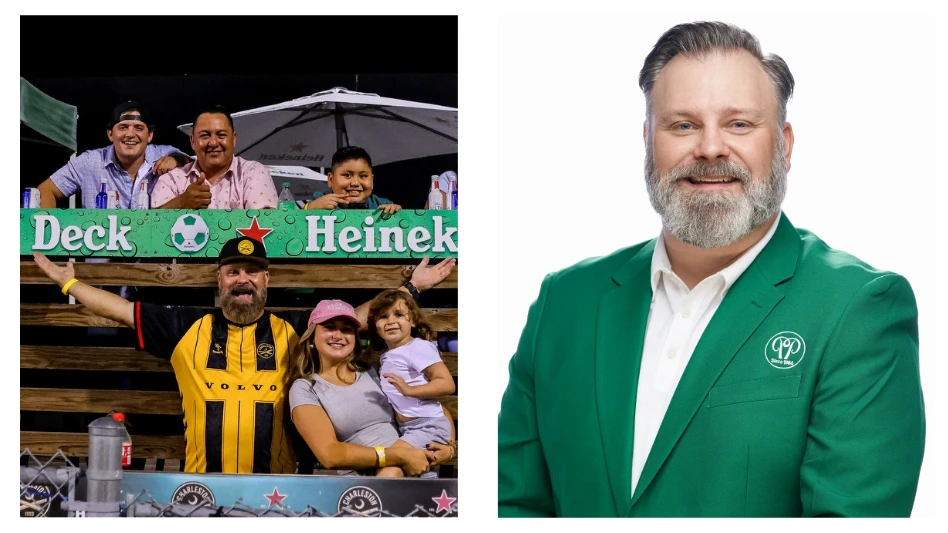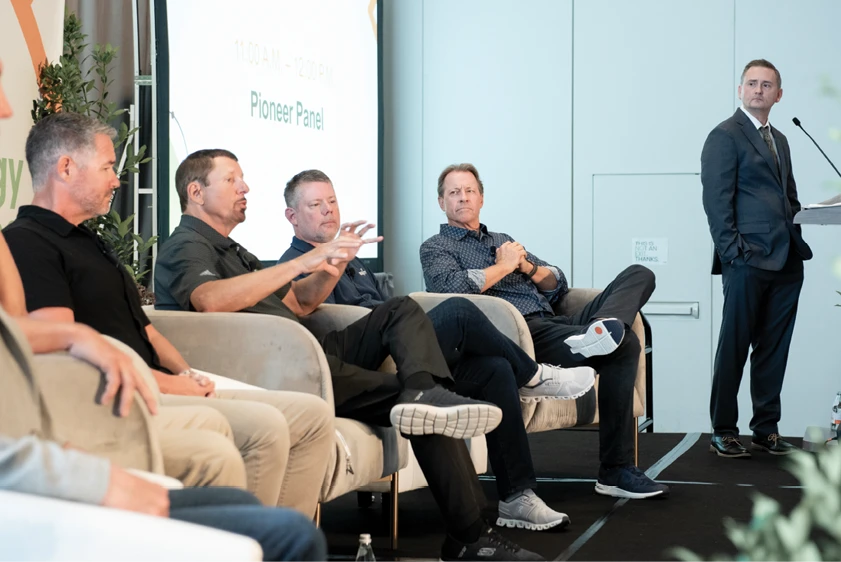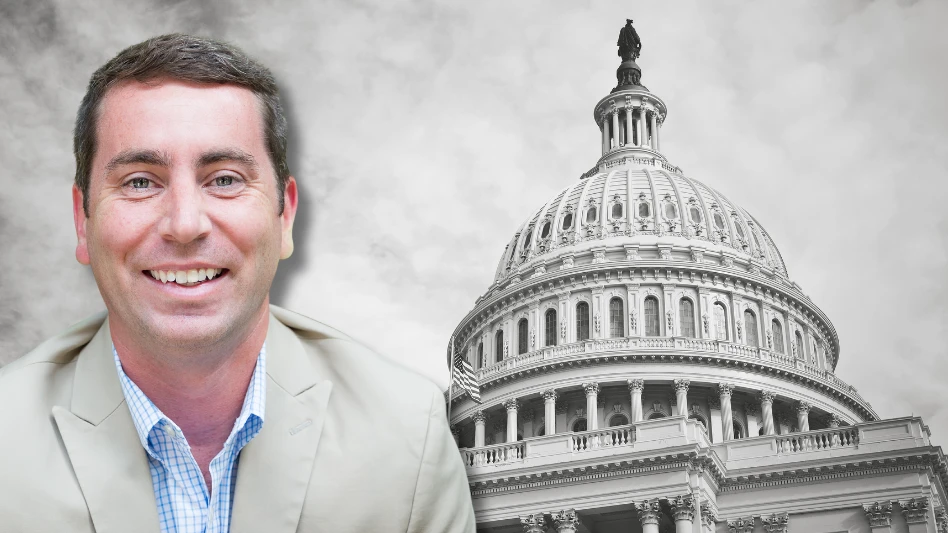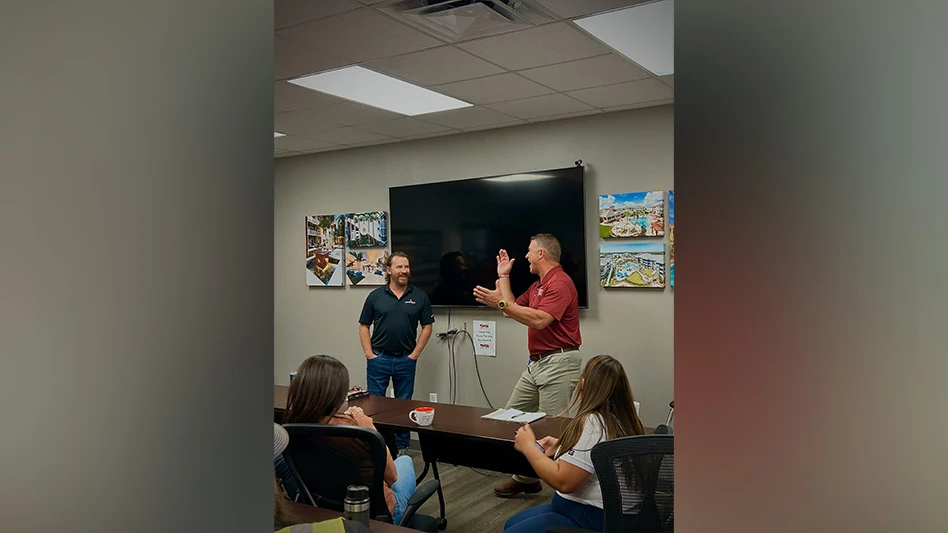
Patrick Savage wants you to excuse the pun. He’s well aware that he’s “totally green” to the landscaping industry.
Savage is the new director of experience at Pleasant Places, a commercial landscaping company in Charleston. He admits that he can’t tell the difference between Rye-grass and Centipede grass. But he can create a standard operating procedure for how account managers should contact their clients, just like he can turn employee events into new business for his company.
Take their Hispanic Heritage Month celebration in September, where Savage encouraged the company to partner with the nearby Charleston Battery, a United Soccer League team. Pleasant Places brought 200 employees to a game, and an employee’s wife made everyone barbacoa and tacos for some pre-game food.
The Battery went from an event host to a client. Pleasant Places helped prepare the stadium last weekend ahead of their quarterfinals game against the Pittsburgh Riverhounds.

“So not only did we do an employee investment event, but that employee investment event got us on the radar of the soccer team, who then in turn got us a contract for cleanup,” Savage says. “(Being the director of experience) is the synergy of all that.”
Savage is just a few months into his role at Pleasant Places, his first green industry job. He's already helped implement the Charleston Battery event and other celebrations like Women in Construction Week, where the company's women received flower bouquets back in March, Savage's first month on the job. He's also led new initiatives at the company that have turned into leaner and smarter operations.
In short, he says the director of experience role at Pleasant Places is to focus on the adoption of a new business model. It's a model that combines a traditional corporate structure found in other industries and what their family-owned business has done for the last 40 years.
Getting to this point is a funny story now. Savage laughs when he remembers finding himself as a “freelance entrepreneur” after COVID-19. He had been working as the senior manager of digital & creative design at Bristol Motor Speedway, but the pandemic forced him into a new role working as a freelance photographer. Through that work, he met Pleasant Places’ Guy Artigues, the owner of the company.
One conversation led to another, and now Savage is working in a role that focuses on external communications and marketing, plus internal employee relations. He feels it works as a major benefit to his company that he has marketing and public relations experience outside of the industry.
“There’s some isolation in the industry: You were a green industry guy, you are a green industry guy, you’ll always be a green industry guy. There’s not a whole lot of outside-the-industry thinking,” he says. “Find someone with some seasoned experience that’s going to challenge you to grow your business.”

Savage says he’s helped spearhead new, more corporate ways of thinking that have led to significant changes already. Pleasant Places redesigned its website and has changed its social media strategy, focusing more on Facebook and LinkedIn than ever before. Plus, he’s worked on reshaping the company’s reputation on Google My Business, the item he calls “the lifeblood of any company.”
He’s also implemented ways to track progress that didn’t previously exist, like tracking how many leads come from the website and customer satisfaction with the service and communications they’ve received.
“Operations are starting to lean up, we’re starting to see profitability rise, we’re seeing customer satisfaction rise in our communication speed — it all comes back to tracking all of this,” Savage says. “That’s the thing, especially in the green industry — they’re so focused on doing the work, that it’s all of the admin, it’s all of the follow-ups… No one ever tracks that or watches that, they’re just going, doing what they do best.”
Savage says he’s been lucky to have buy-in from his fellow employees, especially considering Pleasant Places is a family-owned company with many employees who’ve worked there for decades. Plus, it's not as if the company had been struggling: Pleasant Places hovers around $30 million in annual revenue.
So, his approach has been to emphasize humility when trying to find areas to change.

For example, the company’s currently revising its safety culture. Three months ago, Savage helped draw up the committee to talk about what needs to change. He emphasized having one Hispanic and one American representative from each of the company’s divisions (like hardscapes and maintenance) to sit on the committee and offer feedback.
In other words, he’s asking questions first, not demanding change.
“It’s really not an edict,” Savage says. “I’m getting buy in, I’m getting feedback.”
Savage says there’s lots of seasoned marketing professionals who would benefit a landscaping company. Maybe they’re burned out from corporate structure enough to want a change of pace — he’s found it refreshing in some ways himself. And Savage also knows there’s lots of landscapers looking to change up its approach to external marketing and internal employee retention.
For anyone who’s willing to take the plunge, he recommends asking one key question.
“’Are you ready?’ Change is the hardest thing for any entrepreneur or business to do,” Savage says. “You have to be committed. You have to be all in. The thing you’re talking about is really a major shift in how you do business.”




